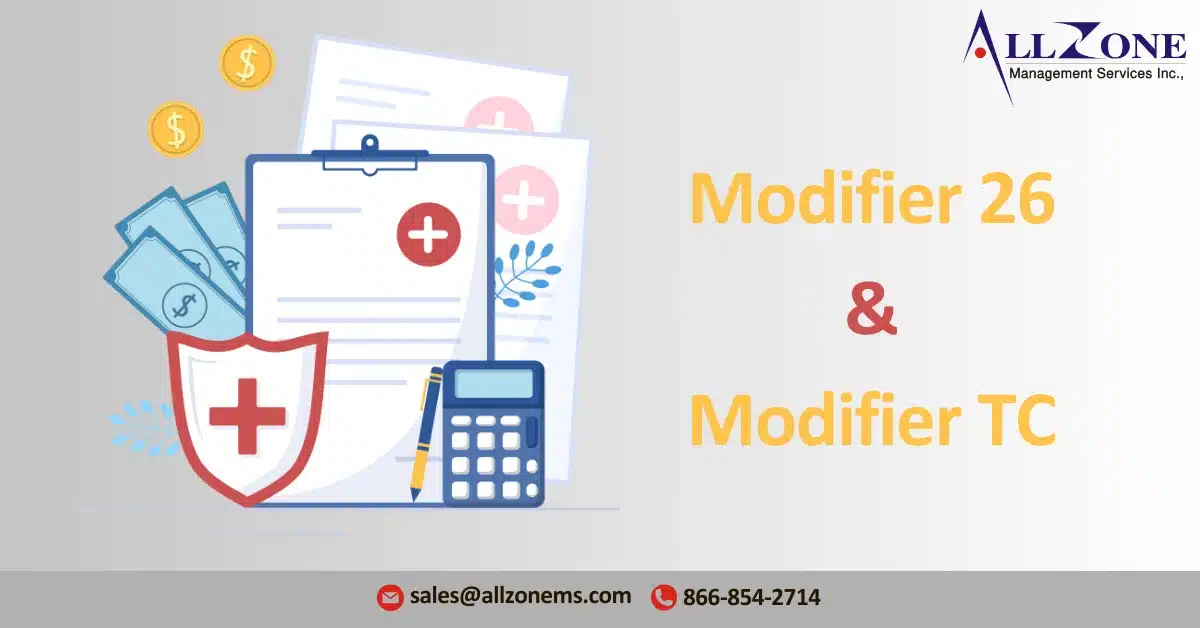In the realm of healthcare billing and coding, modifiers are crucial tools used to provide additional context and specificity to procedure and diagnosis codes. These modifiers help healthcare providers accurately communicate the nature of services rendered to payers. Two commonly used modifiers, Modifiers 26 and Modifier TC, play significant roles in clarifying billing practices and ensuring appropriate reimbursement.
Modifier 26: Professional Component
Modifier 26, often referred to as the “professional component” modifier, is used to indicate that a physician or other qualified healthcare professional is billing separately for the professional component of a service. This component typically involves the interpretation, analysis, and medical decision-making associated with a procedure.
When to Use Modifier 26:
- Separate Billing for Professional and Technical Components: When a procedure is typically bundled, but the professional component requires separate billing due to specific circumstances, such as:
- Physician interpretation of a complex test result
- Medical decision-making related to a procedure
- Significant time and effort spent in managing a patient’s care
Global Services and Significant Separate Work: In cases where a procedure is considered a global service (including follow-up care), but the physician performs substantial additional work beyond the standard service, Modifier 26 can be used to bill for the extra effort.
Example:
A radiologist interprets a complex MRI scan. The facility bills for the technical component (imaging and equipment), and the radiologist bills for the professional component (interpretation) using Modifier 26.
Modifier TC: Technical Component
Modifier TC, on the other hand, is used to indicate that a facility or other entity is billing for the technical component of a service. This component typically involves the supplies, equipment, and personnel required to perform a procedure.
Separate Billing for Technical Component: When a procedure is typically bundled, but the technical component requires separate billing due to specific circumstances, such as:
-
- Use of specialized equipment or supplies
- Performance of the procedure in an off-site location
- Significant additional time and effort involved in the technical aspect of the service
Global Services and Significant Separate Technical Work: In cases where a procedure is considered a global service, but the facility performs substantial additional technical work beyond the standard service, Modifier TC can be used to bill for the extra effort.
Example:
A hospital performs a surgical procedure. The surgeon bills for the professional component, and the hospital bills for the technical component (operating room, supplies, anesthesia) using Modifier TC.
Key Considerations and Best Practices:
- Clear Documentation: Adequate documentation is essential to support the use of Modifiers 26 and Modifier TC. This documentation should clearly outline the specific services provided, the time and effort involved, and the reason for separate billing.
- Payer-Specific Guidelines: It’s crucial to consult with payers to understand their specific coding and billing guidelines. Payers may have specific rules regarding the use of Modifiers 26 and Modifier TC, as well as any additional requirements for documentation and justification.
- Coding Accuracy: Ensure that the correct procedure and diagnosis codes are used in conjunction with Modifiers 26 and Modifier TC. Incorrect coding can lead to claim denials and reimbursement issues.
- Regular Review and Updates: Stay updated on the latest coding and billing guidelines to avoid errors and ensure compliance. Regularly review and update your coding practices to reflect changes in regulations and payer policies.
Why Medical Billing Companies Need Modifiers:
Modifiers are two-digit codes that are appended to a medical billing code to provide additional information about a service or procedure. We are crucial for accurate and appropriate reimbursement in medical billing for several reasons:
- Accurate Coding: Modifiers allow medical coders to precisely describe the specific circumstances of a service or procedure, enhancing the accuracy of the medical billing process.
- Improved Reimbursement: Correct use of modifiers can help healthcare providers receive appropriate reimbursement for services rendered, even if they were performed under unusual circumstances or involved additional complexity.
- Reduced Claim Denials: By providing more detailed information about the service, modifiers can help prevent claim denials due to insufficient or unclear documentation.
- Compliance with Regulations: Proper modifier usage ensures adherence to coding and billing regulations, minimizing the risk of audits and penalties.
- Enhanced Revenue Cycle: Streamlined and accurate billing processes, facilitated by modifiers, contribute to a smoother revenue cycle and improved financial health for medical practices.
Modifiers are essential tools for medical billing companies like Allzone. They play a vital role in ensuring accurate coding, appropriate reimbursement, and overall efficiency in the revenue cycle.
Conclusion
Modifiers 26 and Modifier TC are valuable tools for healthcare providers to accurately communicate the nature of services rendered and ensure appropriate reimbursement. By understanding the specific circumstances in which these modifiers should be used and following best practices, healthcare providers can improve their billing accuracy and avoid potential claim denials.

